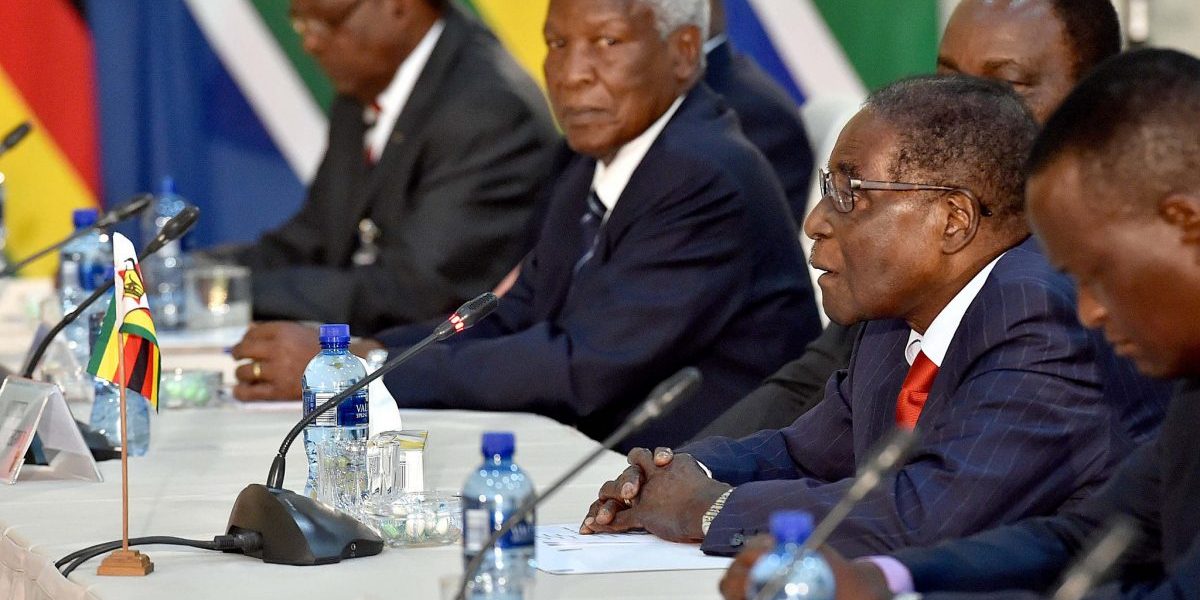African solution efforts draw widespread scepticism from observers who have witnessed the African Union (AU) struggle to resolve conflicts in trouble spots such as Sudan’s Darfur region, and among Africa’s traditional Western donors who have poured aid into Africa with modest results for over six decades. Whether African leaders can indeed solve their own problems is less certain. What does the recently-concluded diplomatic resolution to the Zimbabwe crisis teach us?
Of late, advocates for home-grown solutions at last have at their disposal a single, outstanding accomplishment (they hope): a diplomatic resolution to the Zimbabwean political stalemate over power-sharing that has dragged on since elections in March 2008, and a deal signed but not implemented last September. Thanks to the mediation efforts of the Southern African Development Community (SADC) spearheaded by former South African President Thabo Mbeki, Africa’s leadership have lent credence to the notion that the continent’s political apparatus has the ability to spawn peaceful solutions to deep political problems.
Beyond being a peaceful, diplomatic solution, the Zimbabwean power-sharing agreement is especially notable for its intention to tackle both short/medium term problems and the more systemic roots of that country’s economic and political implosion. In the short term, the SADC-brokered solution divides executive power between ZANU-PF and the Movement for Democratic Change (MDC) by stipulating that each political party play a substantive role in arriving at decisions traditionally associated to with the presidency – such as the appointment of critical government posts. Encouragingly, the Global Political Agreement, as the power sharing agreement is called, grants the respective parties a stake in the control of strategic organs of government that have hitherto been extremely contentious – the security apparatus being foremost among them. SADC’s achievement is also laudable for its intention to develop an impressive infrastructure of expertise to oversee economic recovery, land redistribution and the implementation of the power sharing agreement more broadly.
Restoring freedom of association and assembly, the freedom of expression through independent media and the recovery of Zimbabwe’s crumbling education and health systems are other encouraging aspects of the agreement that Zimbabwe commits to and that the region has pledged to underwrite and support. In a nutshell, there is reason to applaud the persistent efforts of former President Mbeki, for his dogged determination to deliver an elaborate African solution to one of Africa’s most pressing political problems. Time will tell whether this deal will hold and be respected.
In retrospect, however, a critical lesson to be drawn from the Zimbabwean experience of African solution-making is that delivering African solutions is not enough. Attention needs to be paid to delivering timely solutions to crisis. The Zimbabwe deal has come after the implosion of what was one of the region’s more functional economies. Among other indicators of economic collapse, hyperinflationary conditions in Zimbabwe vividly illustrate the extent of economic disintegration. Over the course of 2008, inflation rose from 100,580% in January to 231 million % by the end of the year. Equally alarming, the continued depreciation of the Zimbabwean dollar against major currencies recently forced Zimbabwe’s treasury to officially dollarise the economy by legalising the use of foreign currency as a medium of exchange.
In addition to its economic woes, an estimated 4 million people will need of food aid in 2009, an estimated 60,000 are affected by a growing cholera pandemic while only a third of the population is expected to survive past the age of forty according the United Nations Development Programme (UNDP).
Given Zimbabwe’s political and economic state, the region’s leaders have managed to pen an impressively comprehensive diplomatic solution to the Zimbabwean crisis but at a pace that will require speeding up in similar future endeavours. A key shortcoming of the albeit commendable conflict resolution process in Zimbabwe was the marked hesitance of African leaders to take swift, assertive action in tackling an extensively documented and progressive deterioration in economic and democratic governance that many trace back to the unlawful redistribution of land under the ZANU-PF backed ‘fast track land reform’ programme, and increasing closure of political space by a ruling party threatened with defeat. Arguably, the region missed several critical opportunities to influence the political direction of Zimbabwe as it overlooked widespread reports of severe restrictions on civil liberties and state-sanctioned violence, opting to maintain ‘solidarity’ with Zimbabwe’s leadership instead.
Agility and the ability to provide swift and assertive time and cost-saving solutions are crucial to developing effective African solutions to African problems, if the Zimbabwean experience is to be taken as an opportunity to glean lessons. As Zimbabwe, Africa and their global partners assess how to carry forward Zimbabwe’s reconstruction, they all could draw a lesson from the old adage – that ‘a stitch in time saves nine’.








